Last November, within a few hours of each other, some of the planet’s biggest news websites published an irresistible story. An attractive Argentinian teacher called Lucita Sandoval, from Santiago del Estero, had been having sex with her 16-year-old student, and the video of their tryst had made its way to a porn website. With its heady blend of titillation and depravity, it was the perfect tabloid scandal.
Websites including the Daily Mirror and Metro in the UK and the New York Daily News in the US duly published the story, alongside an image showing the teacher posing poolside in her bikini. “Teacher suspended after sex session with teen pupil ends up on hardcore porn website,” read the Mirror’s headline. The Daily Mail – the most successful English-language newspaper website in the world – even went so far as to claim that there would be a criminal investigation, and that this wasn’t the first time that the teacher in question had sexual relations with a student.
There was just one problem: It wasn’t true.
As BuzzFeed News has previously reported, the story had already been debunked by a local paper in Argentina a full two weeks before the English-language press picked it up. The video didn’t show an underage boy. Although the woman in the video was a teacher, she was from Corrientes, rather than Santiago del Estero, as had been claimed in the incorrect articles. She probably wasn’t even called Lucita Sandoval. Some of the sites have updated their articles, but others remain unchanged (at the time of this story's publication).
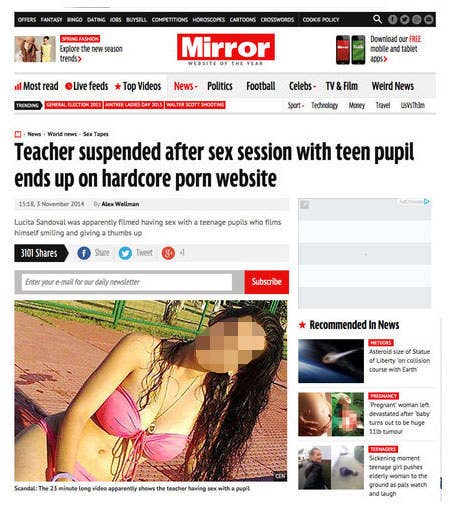
So how did this fake story make the leap from South America to the English-language press? The answer is tucked away in the bottom right-hand corner of the photo of the woman in her bikini: a credit labelled “CEN”.
Central European News (CEN) and its sister outfit EuroPics are small news agencies, largely unknown outside certain sections of the media, whose headquarters are in Canterbury in the UK (although they claim to have 35 staff based in offices across central and eastern Europe). In recent years, CEN has become one of the Western media’s primary sources of tantalising and attention-grabbing stories. They’re often bizarre, salacious, gruesome, or ideally all three: If you’ve read a story about someone in a strange country cutting off their own penis, the chances are it came from CEN.
The firm’s business model, like that of many other news agencies, is to sell a regular stream of stories and pictures to other media companies, which publish them under the bylines of their own reporters. In CEN’s case, these include a string of stories from relatively remote parts of China, India, Russia, and other non-Western countries. They tend to depict the inhabitants of those countries as barbaric, sex-crazed, or just plain weird. And often they are inaccurate or downright false.
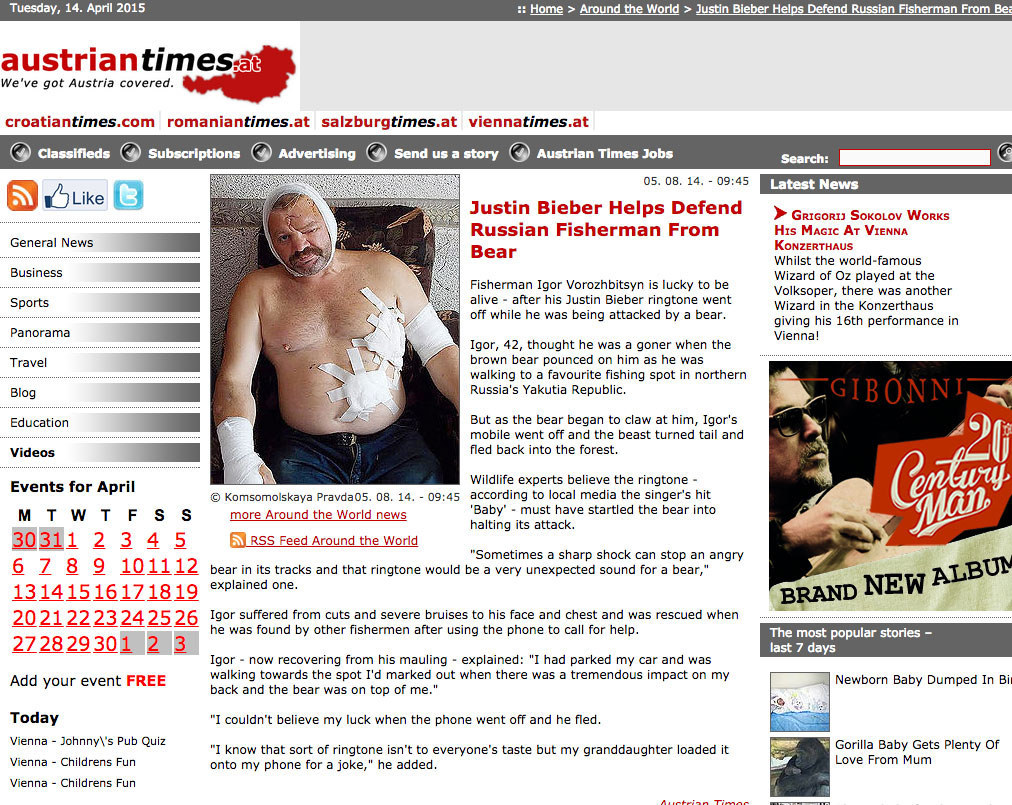
The Chinese woman offering to sleep with men to fund her cross-country road trip? That was CEN. The Russian fisherman who was saved from a bear attack by a Justin Bieber ringtone? CEN. The Macedonian man who chopped his own penis off after his girlfriend told him it wasn’t big enough? Also CEN.
CEN’s "weird news" stories and images appeal to news organisations precisely because they fall into the category of “too good to check”. They also appeal because they are perfectly tailored to the current media ecosystem, in which the holy grail is to have content go viral on Facebook and other social media platforms, delivering a surge of traffic.
One tried and tested method for gaining those viral clicks is running precisely the kind of oddball human interest pieces in which CEN specialises: stories that are so intriguing or horrifying or just plain weird that you can’t help but share them with your friends.
CEN also publishes many unremarkable, genuine news stories – in a statement to BuzzFeed News, the company estimated its total output at 8,000 stories since January 2014. But after growing suspicious of the weird, wonderful, and exotic stories CEN has made a name for itself with – including a few picked up by BuzzFeed News – we decided to investigate, with the help of Craig Silverman, whose website Emergent tracks and evaluates online rumours (since writing this article, Silverman has been appointed as the founding editor of BuzzFeed Canada).
In all, we evaluated 41 CEN pieces that struck us as particularly attention-grabbing. Of those, 11 proved to be completely false or to be based on images that did not match the stories; eight more contained suspicious details such as perfect quotes that appeared in no other coverage; 13 we were unable to verify either way; and nine appeared to be real or mostly real.
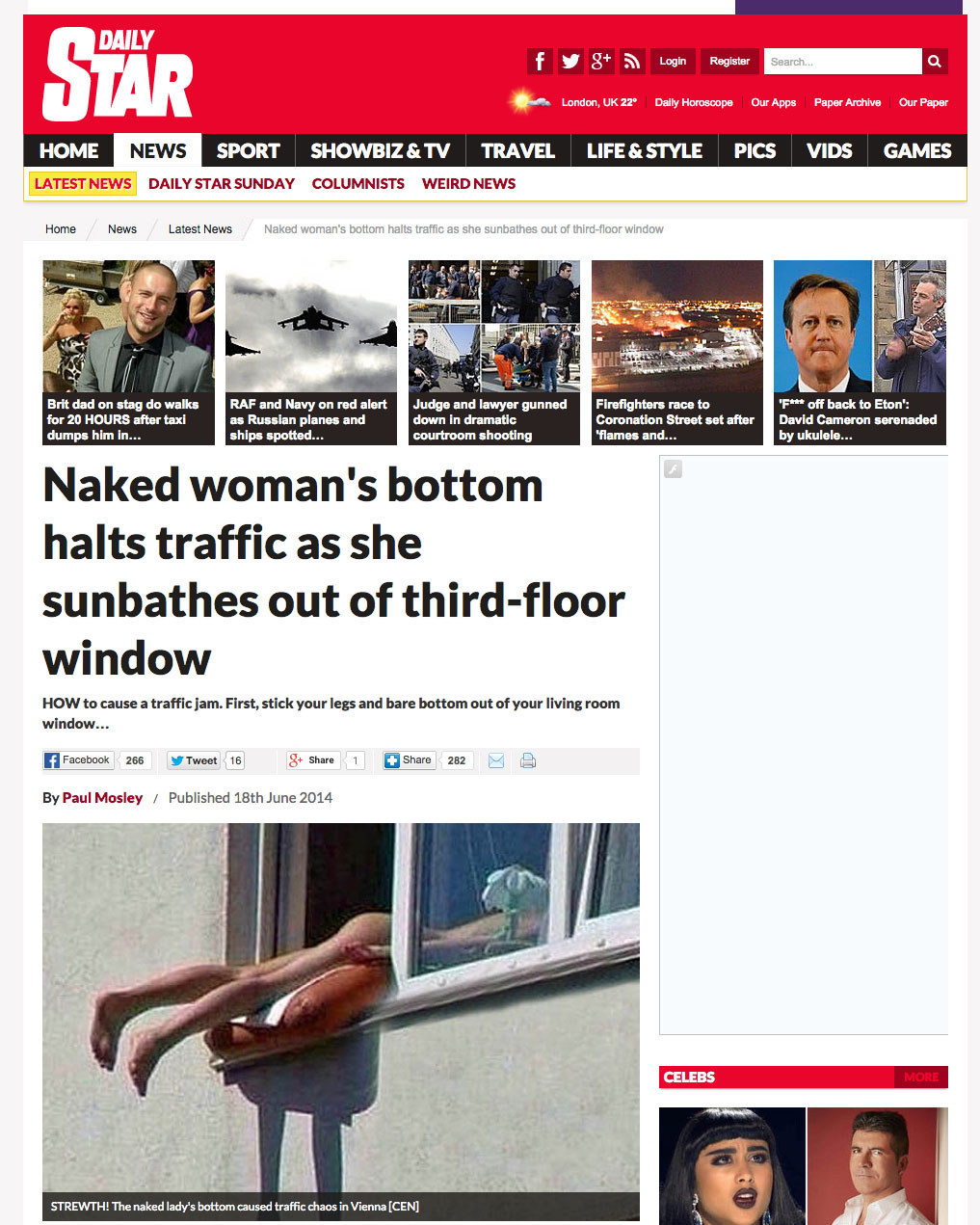
In other words, whether it was the story of Bieber and the bear, the Chinese backpacker offering sex in return for help funding her vacation, a man who got a tapeworm after eating sashimi, or the teacher accused of sleeping with her student, the evidence assembled by BuzzFeed News suggests that an alarming proportion of CEN’s "weird news" stories are based on exaggeration, embellishment, and outright fabrication – and that the company has scant regard either for the accuracy of its content or for what happens to the people, such as the woman in the bikini, whose names and images are spread across the world.
In a letter to BuzzFeed News, CEN’s legal representatives said the firm “denies absolutely that it makes up false stories or fabricates quotes”. They claimed that the firm “relies on trusted contributors to source content”, that there is “no evidence of a ‘pattern’ of behavior of fabricating stories”, and that the fact that “a tiny minority” of its stories “might raise questions is not indicative” of such.
They insisted that since CEN “is BuzzFeed’s main competitor for viral news content in the UK market” – something BuzzFeed would dispute given our completely different business models – they would not be answering questions about its journalistic methods because it would “involve giving information about its sources and practices to a competitor”. We have made the full letter available online, but have redacted one section dealing with matters outside the scope of the current story.
Because BuzzFeed News – contrary to the claim made in the legal letter – is no longer one of CEN’s clients, it has sometimes proved impossible for us to verify absolutely that a particular story has been circulated by CEN, as opposed to just the pictures on which its credit sits, although we believe that selling both picture and story together is the firm’s invariable practice. Instead, we have relied on similarities between the copy on the company's sites and other published versions of the story, or on the fact that competing news organisations have produced near-identical stories, featuring matching quotes and details, accompanied by pictures credited to CEN. We have also asked CEN to verify whether it was responsible for the details and quotes we have concerns over. It has, as mentioned above, refused to do so.
Going Viral
To illustrate why we became concerned in the first place, let’s take the example of a CEN story that swept across the internet last August. The premise was simple, dramatic, and delightful: A Russian man on a fishing trip was attacked by a bear. As it mauled him, the man’s phone played a ringtone that startled the animal so badly it ran off, saving the fisherman’s life. The ringtone was the song “Baby” by Justin Bieber.
As with the Lucita Sandoval story, it resulted in articles on some of the world’s biggest newspaper websites – including the Daily Mail, the New York Post, the Sydney Morning Herald, the New York Daily News, the Daily Express, the Daily Mirror, and indeed BuzzFeed News. (We estimate that BuzzFeed News has run approximately a dozen stories based on CEN’s content, which have now been updated to alert our readers to our doubts over their credibility. A full list is at the bottom of this article.)
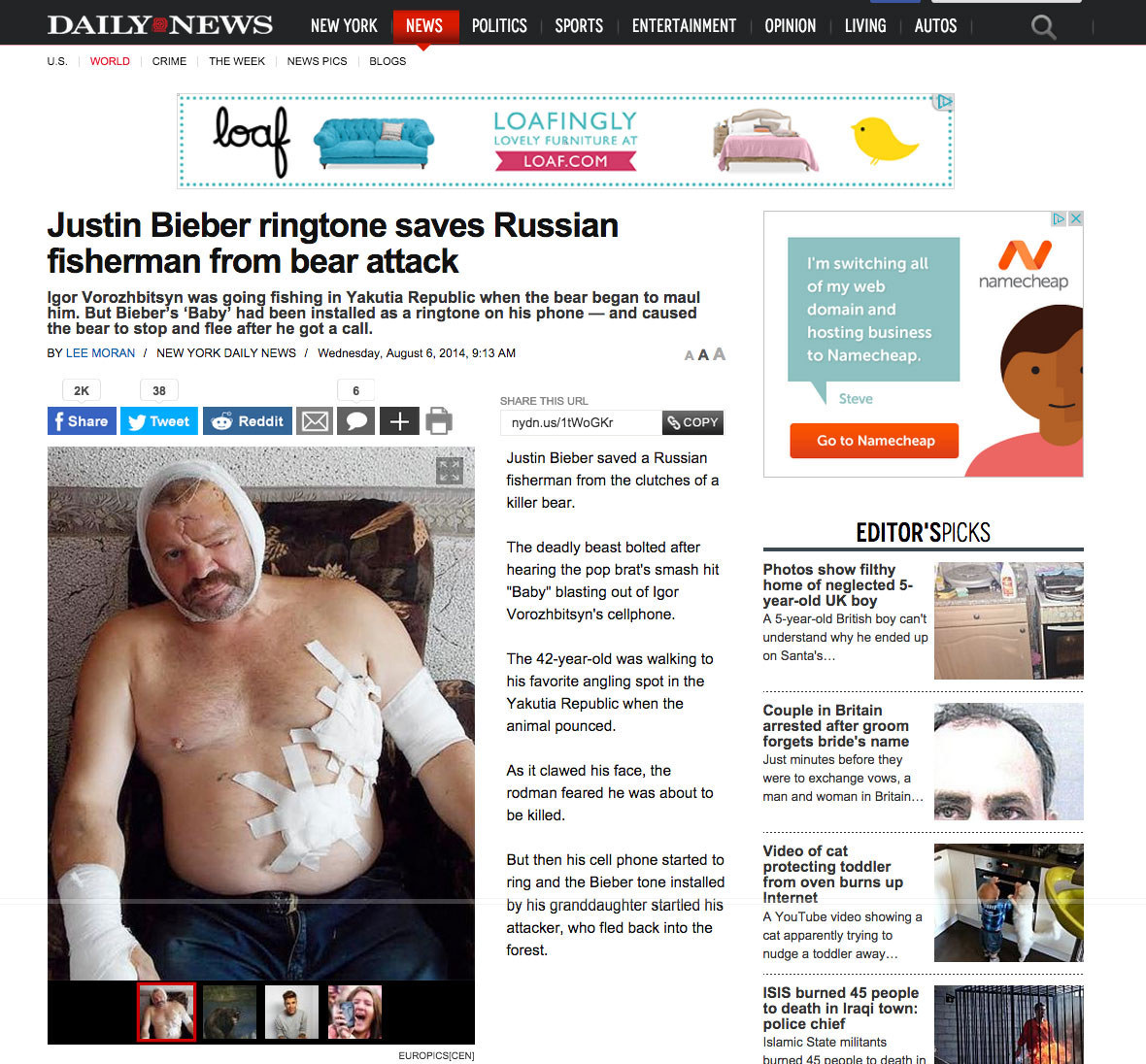
“Even bears can’t stand Justin Bieber’s music,” reported the New York Post. “Finally proof that Justin Bieber IS unbearable,” chortled the Daily Mail. The story was shared more than 20,000 times on social media (counting only the articles mentioned above). The Bear vs Bieber tale even made it into a Seth Myers monologue for his late-night show on NBC.
Yet the original story about the bear attack, which was published in Russia’s Komsomolskaya Pravda, said nothing about a Bieber ringtone. Instead, it reported that the man’s phone had a setting that caused it to speak the current time. That’s what actually scared off the bear.
Komsomolskaya Pravda published its story about Igor Vorozhbitsyn, the Russian man who survived the bear attack, on 31 July. Five days later, the story appeared on the Austrian Times, a website run by CEN’s owner and co-founder, Michael Leidig, with a photo of the fisherman (properly credited to KP) and the new detail about Justin Bieber.
That same day, CEN sold the story and images to the Daily Mail, whose story credits the images taken from Pravda to CEN instead. The agency never takes a byline on its stories: They are always credited to in-house reporters. But the emails the firm sends to its clients every day with a lengthy list of stories to pick from offer packages of pictures and text that are often published virtually unchanged. The copy also often appears on sites owned by Leidig, making it clear where the stories have originated. In this instance, the Mail’s story included the same key quotes and details, and many similar phrases, as the one published on Leidig’s Austrian Times site. (All told, more than half of the suspect CEN stories cited in this article had identical or nearly identical versions published on a site owned by Leidig.)
With the story taking off online, one of the authors of this article, Craig Silverman, attempted to verify its veracity by speaking to Leidig. A woman who answered the phone at the Austrian Times said he was on vacation in Romania. When asked how the agency would find and cover such a story, she said: “A lot of stories are found on the wire or in local media but also from local interviews on the ground, or we speak to the reporters who wrote them; we speak to police to get things confirmed.”
She promised to check with the company’s freelance agent in Russia and follow up. From that point, Austrian Times/CEN/EuroPics stopped providing information or responding to emails.
More recently, CEN sold another Russian story. The agency’s copy, purchased and published by the Daily Mirror, claimed that two Russian women from Khabarovsk, near Vladivostok, had been fired from their jobs at a department store after they spent an afternoon participating in a nude photo shoot.
BuzzFeed News tracked down the images and found they originated with a Russian news outlet from the area. That piece identified the photographer as Gene Oryx, whose online portfolio includes nudes. The Mirror story credited the images to a “Dimitry Kulishenko, 30” – but online searches for that name return no mentions apart from those linking back to the Mirror piece.
In an email, Oryx confirmed to BuzzFeed News that he was the original photographer and attached an high-resolution, uncensored copy of one of the photos to prove his claim. He also said that the women in the picture do not work in a department store, and that the names listed for them in the CEN/Mirror story are false. By implication, that also means the quotes attributed to four different people in the story – one of the women, a “shocked” onlooker, a police spokesperson, and a spokesperson from the department store – are fabricated.
In other words, it appears that CEN took the photos, invented a newsworthy narrative, inserted false names for the women, credited a nonexistent photographer, and fabricated four sets of quotes to fill out the text. Then it sold the story and images. (Oryx said no one from CEN contacted him to license his images for resale.) BuzzFeed News asked CEN to explain how this happened but received no specific response beyond the more general denial.
The Man From CEN
In a 2013 op-ed for the British trade magazine Press Gazette, Michael Leidig proudly described the kind of traffic CEN could drive to large websites:
“Most of our regular content is also for the tabloid market. Not the celebrity stuff, but the quirky bizarre news designed to get people talking – today they call it viral news.
“Our content is often frequently in the Most Read section on the Mail Online.”
Leidig is the owner and co-founder of CEN. He is also runs a charity called Journalists Without Borders, which claims to provide money to the needy sources featured in CEN’s stories. It solicits donations on CEN’s site via PayPal that it says it redirects to people featured in the articles who may be in need of medical care or financial support.

Leidig’s lengthy and frequently updated Wikipedia page describes someone who cares about accountability and the importance of crediting original sources:
“Leidig is also a campaigner for greater support for journalism which he describes as the ‘coalface of democracy’. He has campaigned in favour of more responsibility from search engines like Google to give credit to original source material and also for payment for originators of news, arguing that if the journalists all go out of business nobody will provide the content worth having.”
The sole link in the above passage goes to a story on the Austrian Times – a website owned by Leidig.
Many of the key edits and contributions to Leidig’s Wikipedia page are by a user called Bylinebandit, who is also a major contributor to the page for the Austrian Times. Bylinebandit also worked on a "sandbox" page for Allan Hall, a journalist with whom Leidig co-authored a book. The subject of that book is an Austrian woman who was kidnapped at a young age. Bylinebandit has made repeated edits to her page. Bylinebandit also happens to be the username for a Twitter account that appears to belong to Leidig. (CEN’s lawyers claimed: “Our client’s Wikipedia page is entirely uncontroversial and has nothing at all to do with your story.”)
Leidig started his career in the British regional press, before moving to Austria in 1993. It was there that he and two colleagues founded CEN, which began with a focus on sourcing newsworthy items from eastern Europe and rewriting them for the London market.
In that Press Gazette op-ed, Leidig painted a picture of a young agency that was earning good revenue and employing “full-time paid correspondents across Europe”. “Having English-speaking staff on the ground in Europe was almost a licence to print money,” he wrote. His clients apparently included the BBC, Deutsche Welle, and Radio Netherlands, as well as major British newspapers. CEN also produced TV footage for clients. A single story such as that of Heinrich Gross, an Austrian doctor who conducted experiments on children for the Nazis, could, wrote Leidig, “be sold a dozen times in various media formats”.
But then the bottom fell out of the business. Leidig wrote that CEN’s income “fell by 80 per cent” after 9/11, and it seemingly never recovered. A steady gig he had with the Telegraph Media Group that paid him £500 a month plus fees for the articles he produced was ended by the organisation. According to Leidig, it told him “there was no longer value in original content, and that was because of the competition from the internet”.
So it appears that Leidig decided to play the online game, as he saw it. He launched websites such as the Austrian Times and Croatian Times. He cast his net far afield to China, India, and Latin America, scouring for images and posts on social networks that he could weave a story around in order to hit up old clients with a new kind of content.
It’s paid off; many major news websites are regular clients. One major British publisher buys multiple CEN stories every day, sometimes more than 100 a month. At £50 per story – which is what BuzzFeed News was charged before it severed its relationship with CEN – that amounts to a sizable income stream. CEN itself claims to have offered its clients more than 8,000 stories since January 2014.
But for CEN’s clients, the relationship more than pays off. According to social media tracking service BuzzSumo, the second most-shared Daily Mail story of the last 12 months – about a Chinese man who got a tapeworm from eating too much sashimi, complete with explicit X-rays – was one that was bought from CEN. But not everything was quite as it seemed.
Tapping the Chinese Market
The tapeworm story originated on the Chinese news site hk.on.cc. CEN/Europics spotted the story, and it was soon distributed far and wide. Again, BuzzFeed News was one of many sites that covered it.
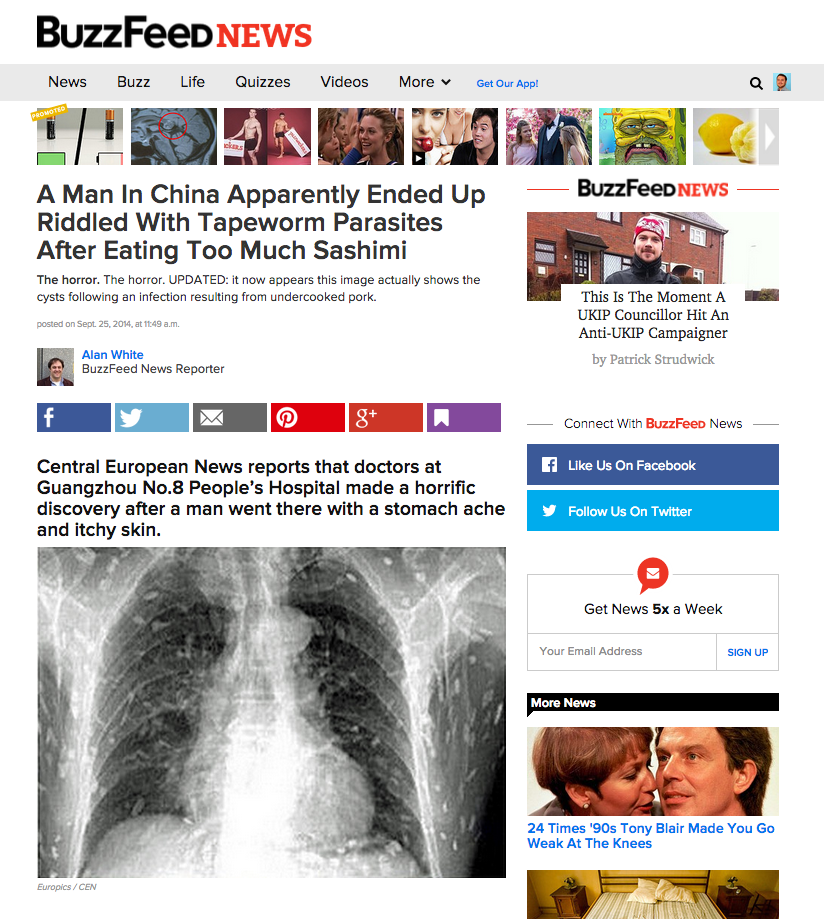
Soon after the story made the rounds, it was investigated by the debunking site Snopes, which found that the x-ray photos of the alleged victim were “similar to those included in a 2014 case report published by the British Medical Journal that dealt with a man who contracted a rare case of disseminated cysticercosis through the consumption of uncooked pork (with no mention of raw fish)”. It does not appear that CEN ever alerted its customers to the fact that the images had been debunked; the original story remains online at the Daily Mail and elsewhere.
Then there was the story claiming that an attractive Chinese woman was offering to spend a night with men in exchange for them helping her travel around the country. The New York Daily News and the Daily Telegraph credited their images of the woman to Europics, CEN’s sister agency. The reality, as reported by Shanghai Daily, was that it was a hoax to promote a dating app called Youjia, which the paper said had been banned as a result.
After the story was proven to be a hoax, Leidig’s Austrian Times published a story about the debunking. It reported that Chinese officials were “particularly angry about the viral story widely spread on Chinese social media sites and also reported extensively in Chinese media and international media”.
Other stories published by CEN investigated by BuzzFeed News were equally problematic. One, published in Leidig’s Croatian Times on 17 November, was called “No Kidding – Baby Goat Has Two Heads”.
The goat story featured this image, credited to Europics, of a baby goat supposedly born with two heads.
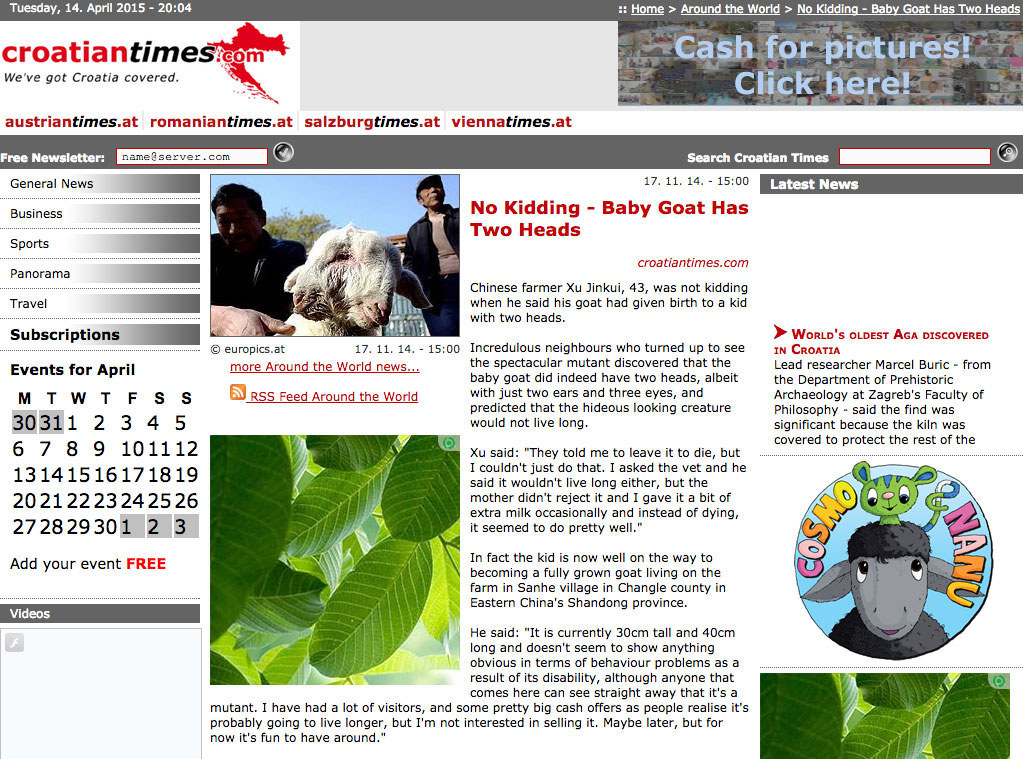
The photo originated with the Xinhua News Agency in China five days earlier. At the request of BuzzFeed News, Dr Neal Krawetz, the creator of the FotoForensics photo analysis platform, which is used by law enforcement and others to examine digital images, analysed the image.
Krawetz found that the two men, the hand in the bottom left, and the two goat heads each show up as “distinct regions under a variety of analysis methods”. He said the evidence was “conclusive” that it had been digitally enhanced.
The Perfect Quote
Along with the questionable nature of the image, there is an even bigger problem with the goat story. The original Xinhua story about the goat contains very little text or information. A follow-up article from the next day credited to the same agency and reporter offers more detail, but is still very thin on quotes. Yet the Croatian Times story quotes farmer and goat owner Xu Jinkui at length. It also lists his age as 43; Xinhua says he is closer to 60.
Here’s a quote attributed to Jinkui:
“It is currently 30cm tall and 40cm long and doesn't seem to show anything obvious in terms of behaviour problems as a result of its disability, although anyone that comes here can see straight away that it's a mutant. I have had a lot of visitors, and some pretty big cash offers as people realise it's probably going to live longer, but I'm not interested in selling it. Maybe later, but for now it's fun to have around.”
A Xinhua journalist who claims to have seen the goat in person didn’t get the farmer to talk. But a news agency based in Vienna somehow did, despite the story taking place in a remote rural community a six-hour train ride from Beijing.
The nature of the quote fits a pattern. CEN's stories frequently contain lines from sources that no one else could track down or persuade to talk, including the local media. And many of those quotes, especially those from anonymous “officials”, include phrases that one would expect to hear from someone who grew up in the UK.
For example, the Bieber/bear story included this quote from an anonymous “wildlife expert” who was presented without any affiliation or location:
“Sometimes a sharp shock can stop an angry bear in its tracks and that ringtone would be a very unexpected sound for a bear.”
As with the goat farmer, CEN often quotes named people who speak in perfect paragraphs and use anglicised phrases. For instance, in January this year a number of news websites — including Leidig’s Austrian Times — ran a story about an underwear thief who, according to the Mirror, “was forced to walk around a block of flats in Singapore with bras and undies hanging from his neck after residents laid a trap following a spate of kinky thefts”.
Our investigations led us to this Chinese-language news post with watermarks from this Weibo account. The post is from a girl named "Yeeyee" (from Singapore). In her brief account she writes that on 1 November, at around 2am, she found a man in her house stealing her undergarments. She then "caught him" and wanted to "shame him". There also appears to be a video of the incident.

Conspicuous by its absence from any of the original sources was a quote that appeared in the English press from a “police spokesman”, who said: "We don't condone vigilante activity but in this case it seems to have turned out OK.” Also missing were quotes from a “local man”, Teo Goh, who apparently said:
“We realised he was targeting windows where he knew women lived. He came at around midnight and as soon as he was in the room we grabbed him, forced him to wear the girl’s lingeries and then frog-marched him from door to door making him confess what he had done and to promise he would never do it again.”
Or take this quote from a CEN story that claimed a wife discovered her husband cheating with her twin sister and then left them both naked in a parking lot before driving off in their car. It comes from a witness identified as You Meng, but reads like it’s being spoken by someone interviewed on a London street:
“It was so funny. Loads of people were grabbing their phones and I did as well. He was banging his fist on the window and shouting at her, and she just wasn’t playing ball.”
When this story was covered earlier by the Chinese-language media, none of the online posts included the names of the man and his wife or their ages, or any quotes from a witness. Somehow CEN managed to get names, ages, and a quote from the scene, in spite of the distance and language barriers.
It is possible that such quotes are genuine, and have been cleaned up and anglicised by CEN’s editors or someone else involved in the stories' production. It is also possible that they have been introduced somewhere else in the media food chain, or inserted by junior staff without the knowledge or approval of the editors concerned. CEN, as mentioned above, has insisted that it does not fabricate quotes. But it has also refused to answer BuzzFeed News' questions about where these quotes originated on the grounds that doing so would lend a commercial rival undue insight into its business practices.
The Sausage Machine
Nowhere are CEN’s quotes more perfect or its details sharper than when it comes to one of its signature issues: castration. Since October, CEN has sold and/or published five stories that involve a man or child either being forcibly castrated or chopping off their own penis.
Take, for example, the story of an aunt who castrated her young nephew when he interrupted her. That story was reported in Chinese media and came with detailed photos of the boy and his parents.
The CEN version, however, includes two quotes that we couldn’t find elsewhere. There was this, from a “hospital spokesman”:
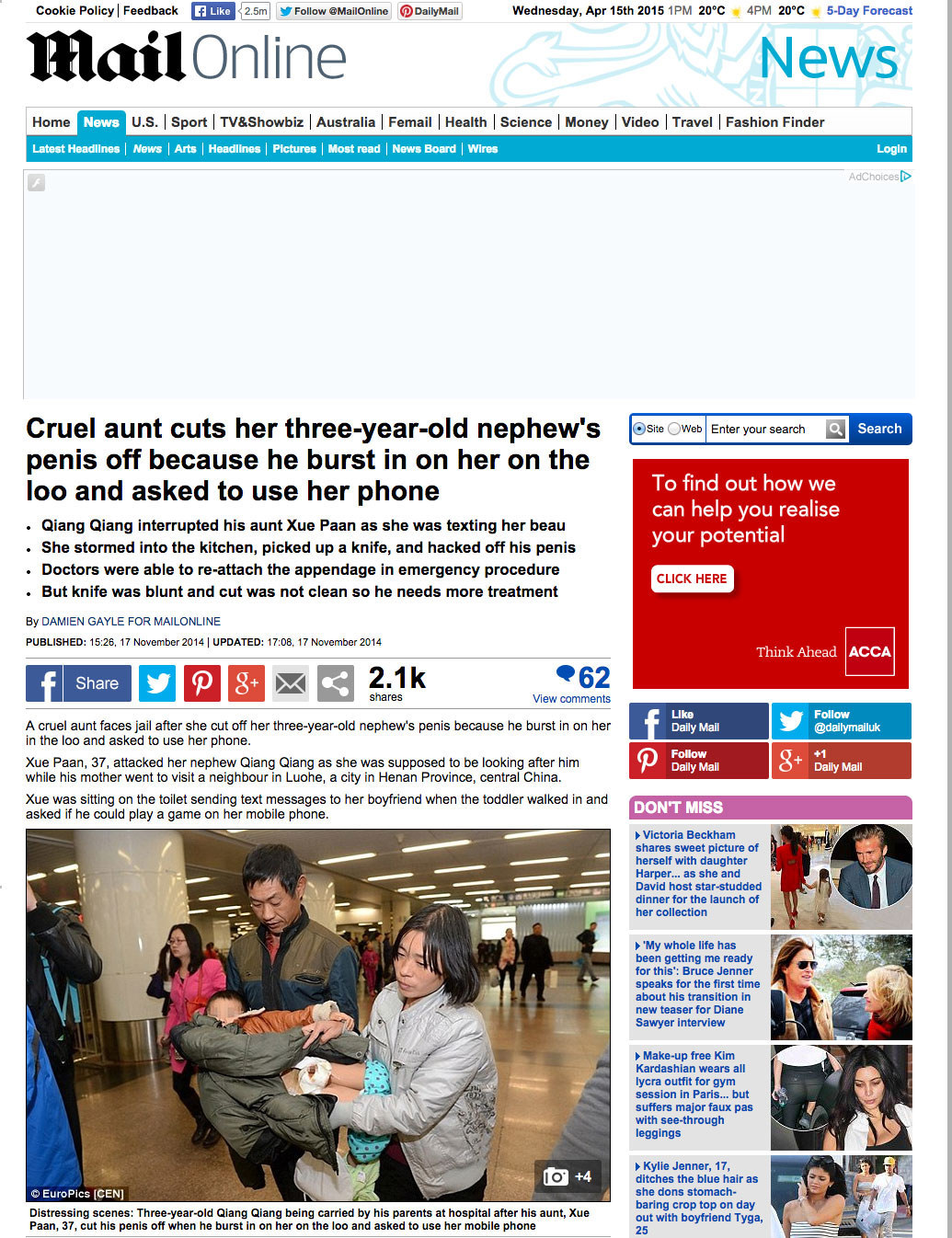
“Unfortunately, the knife was quite blunt and the cut wasn’t clean so although we reattached the boy’s penis, it wasn’t ideal and he had to have further treatment.”
And this, from a “police spokesman”:
“The aunt was arrested and admitted attacking the boy because she was angry that he had interrupted her on the toilet.”
All these quotes also appeared in the version of the story published on the Austrian Times site.
Another unnamed police spokesman appeared in a CEN story about an Indian man who allegedly had his penis chopped off by a crowd after he was caught trying to rape a girl. That story came with many related photos that we were able to find online (including one of the man’s severed penis). But BuzzFeed News could find this quote only on sites that bought the images from CEN:
“People cannot take the law into your own hands.
“As deplorable as these crimes are, law and order has to be maintained, and not lynch justice.
“We ask those men who carried out this attack to hand themselves in before we find them.”
The same was true for this quote from local man Aamir Dhawan:
“No one went to help the man because they could see his penis on the ground and knew this was punishment for a sex crime.
“We have had a lot of intolerable offences against women in this country recently, with girls being raped, hung, and molested, and it’s time it stopped.
“This sends out a very strong message to anyone like that - if you do it you will be punished.”
In January CEN hit the mother lode of foreign castration stories. Pictures surfaced on a since-deleted Chinese Weibo account – and then spread to other Chinese sites – that described a man whose penis was chopped off twice in the span of a few hours. The CEN version that appears on the Daily Mail site has, at the time of writing, been shared more than 40,000 times. (It also appears on the Austrian Times.) The versions on the Mail, Austrian Times, and Mirror sites all feature virtually identical pixelation that happens to cover up the original Weibo watermark.
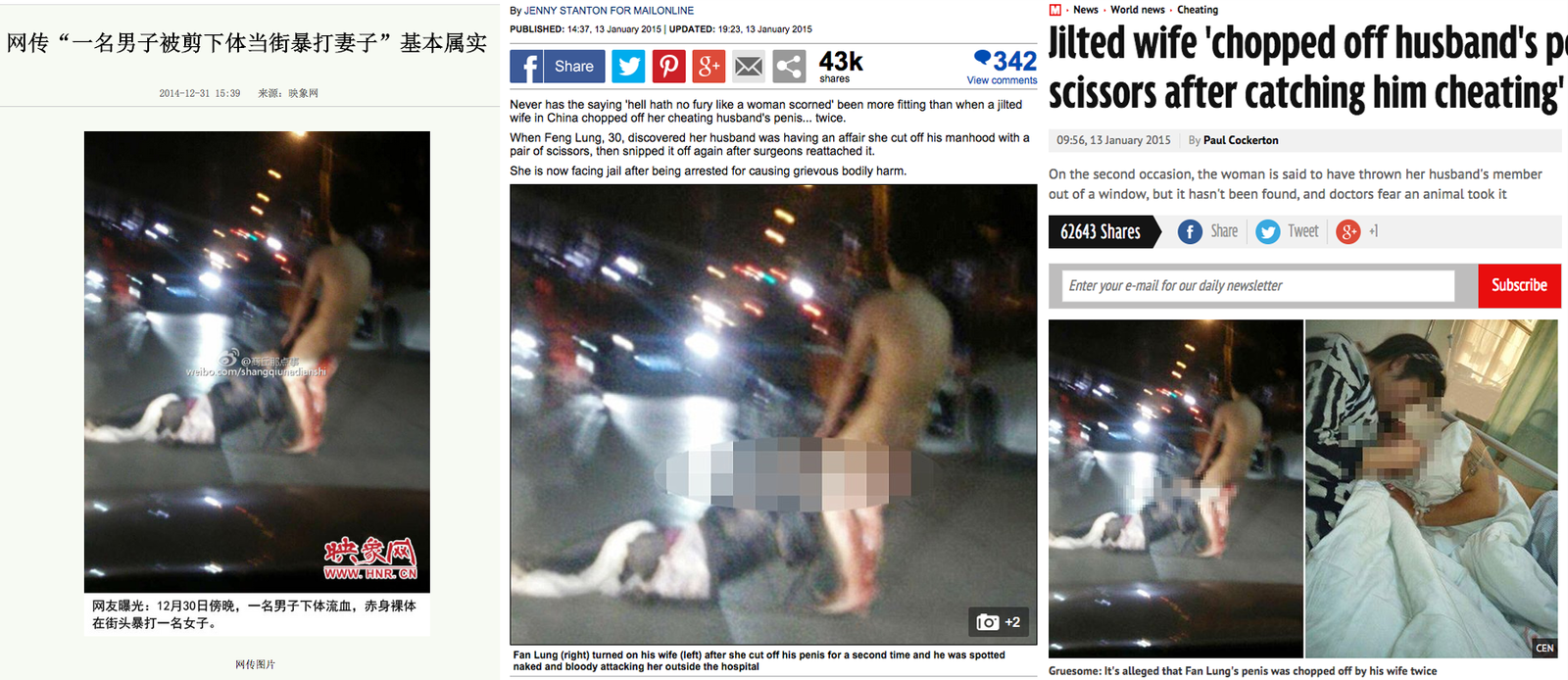
First, the story claimed, the man’s wife discovered him cheating and she castrated him. Then she found him at the hospital and undid the work doctors had done to reattach his penis.
The earliest version we could find of the story in Chinese included a quote from the mistress saying that it didn’t matter if he was now infertile as he already had five children. But once again, the version that ended up on Western media sites went further. In addition to that quote, it also offered a veritable monologue from an anonymous hospital spokesman:
"The first we were aware of what happened was when someone came into the reception area to say a naked man was beating up a woman outside the hospital.
"Staff rushed out to see what was happening and found the patient with blood streaming down his legs hitting the woman.
"He was stopped and the woman was taken in for treatment, and then we discovered she had chopped his penis off again.
"The man had lost a lot of blood and was taken in for emergency surgery.
"He is now in a stable condition but is extremely emotionally distraught."
Another cautionary castration tale came in an October report from CEN that a Macedonian man had chopped off his penis and threw it in the trash after his girlfriend told him it was inadequate.
The story was published on the Austrian Times and apparently sold to the Daily Mirror that same day, October 23. The Austrian Times and Mirror stories both used a photo of a man lying on a gurney with a bloody crotch, with the Mirror specifically saying it showed the victim.
Almost exactly a year earlier the Mirror had run another CEN story about a castration – and used the very same image of the man with the bloody crotch.
In that story, which also credited the image to CEN, the man being shown was described as a 26-year-old Chinese man named Yang Hu who had allegedly chopped off his own penis due to frustration with his nonexistent love life. That story also included the remarkable claim that Hu biked to the local hospital to try to get treatment, only to be told to go back home and get his penis so they could try to reattach it.
The presentation of the old castration photo as new was revealed in 2014 by Metro Sweden’s Viral Examiner column, which looks into suspect online stories. (Metro Sweden is not connected to the UK Metro, which regularly runs CEN images.) It found that the Macedonian castration story probably originated with a local TV report that consisted of re-enactments and stock footage and also used the old image. Either CEN didn’t recognise that it was a photo it had previously distributed, or it knowingly sold and published an old image as new.
Again, BuzzFeed News has asked CEN and the sites that published the story to verify the details in the stories concerned but has had no specific response.
Who’s It Hurting?
One of CEN’s specialities – as with the naked Russians – is to offer its clients a story to accompany a particularly compelling image. Earlier in 2014, Metro Sweden’s Viral Examiner column found another fake story, which had appeared in the Metro, the Mirror, the Huffington Post, the Daily Star, Jezebel, and more. A woman had apparently caused a car crash in Vienna by sunbathing with her bottom half hanging out of her window. But the photo in question dated back to at least 2011, and no such incident had been recorded by the city’s police. In fact, the picture was used in 2014 by a reader in an attempt to fool an Austrian newspaper.
In the version of the story that went around the world, the picture of the woman is accompanied by the story about a car crash in Vienna. There is also a quote from a bystander, identified as “motorist Michael Kineast”, who says:
“I was behind two guys who had a fender bender because the motorists in front took their eyes off the road to glance up at the view. The young woman was obviously keen on getting some sun in a place where it doesn't usually shine.
"I heard the guy who was rear-ended shout to the motorist who had hit him: 'Didn't you look where you were supposed to be going?'
"The driver who hit him said: 'Sorry, I was distracted,' and pointed up to the window where the woman was lying. The guy who was hit then said: 'Oh, right, I see what you mean'."
Again, the text and years-old image used by (for example) the Daily Mail is an almost word-for-word copy of what was on Leidig’s Austrian Times site.
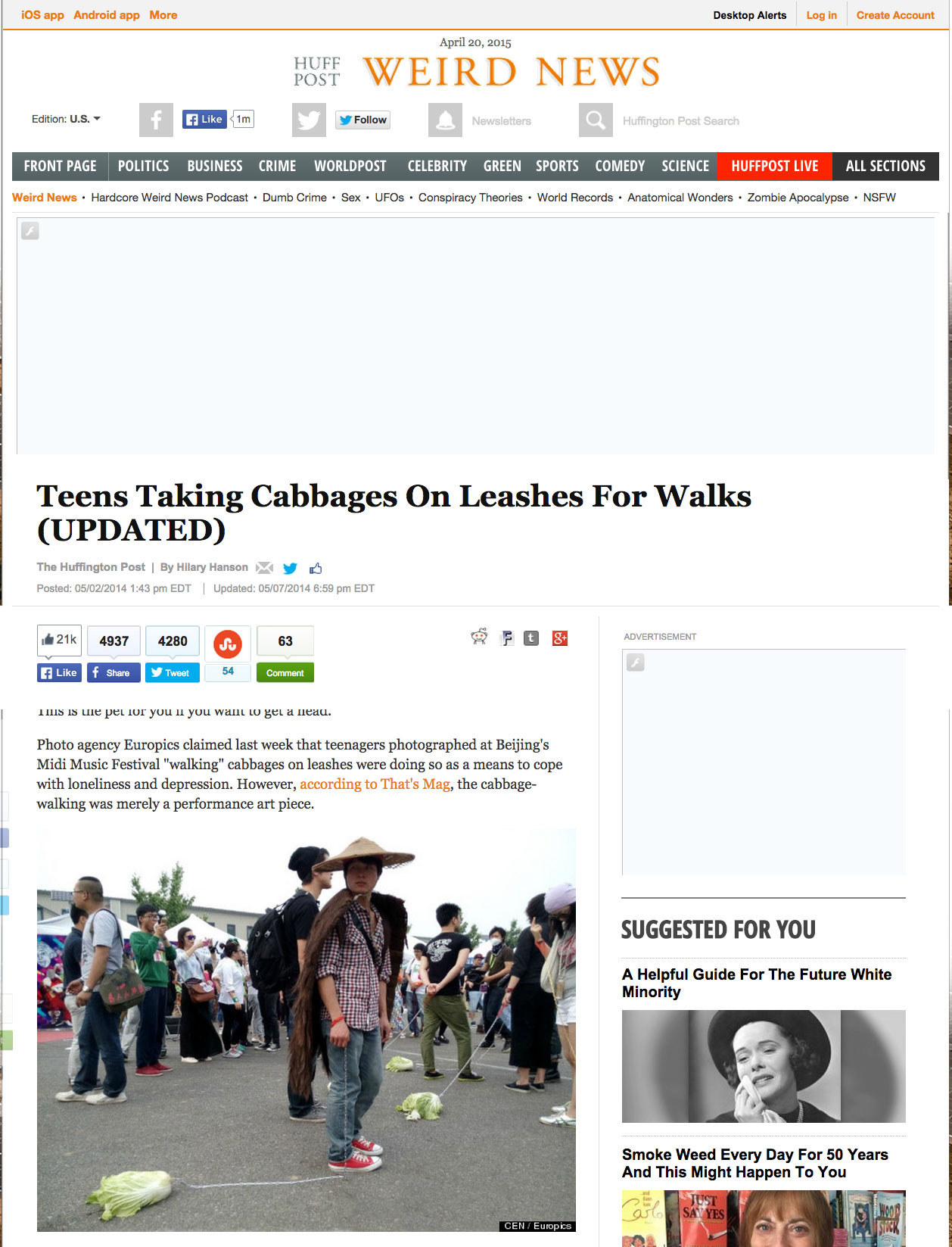
In May 2014, similarly, a story appeared on sites including Metro and the Huffington Post (the latter has since corrected the piece) that claimed Chinese teenagers were attempting to alleviate their feelings of loneliness by taking cabbages for walks.
The story included quotes from “Chinese psychiatrist Wen Chao”, explaining how walking a cabbage on a lead can help reduce feelings of isolation, and a 17-year-old called Lui Ja Chen, who supposedly said:
“I feel I can transfer my negative thoughts about myself to the cabbage, go for a walk with it and come home feeling better about myself.”
The pictures were credited to CEN, and the same quotes appeared on the Austrian Times site.
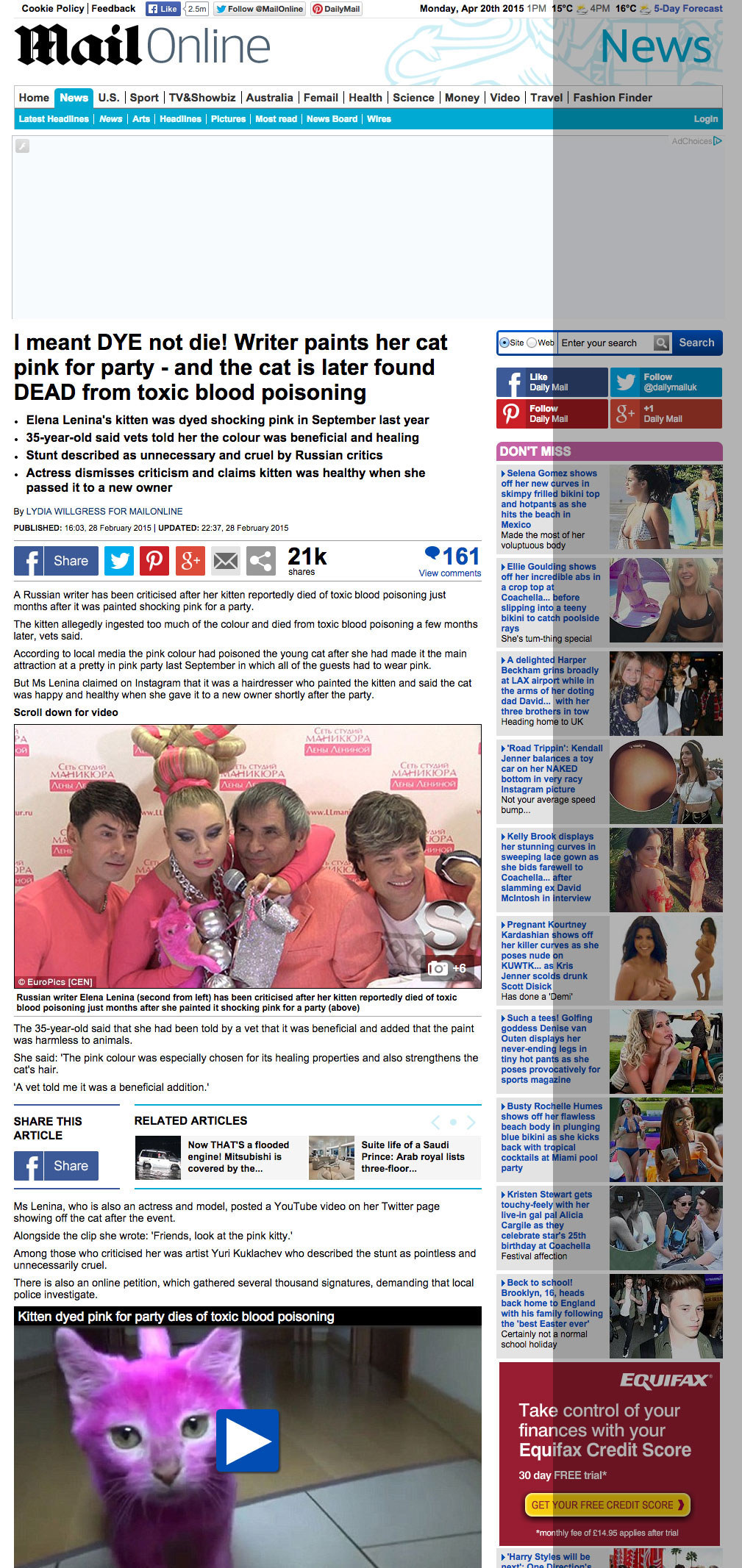
Unsurprisingly, the story was quickly debunked, by Kotaku, BuzzFeed, and the Wall Street Journal. The teens were not walking cabbages because they were lonely: They were walking cabbages as part of an art event at a music festival by Chinese artist Han Bing (who has been walking cabbages as part of his art for over a decade).
Misleading stories built around a compelling image can have real-world consequences. An example of this is the CEN story about a woman named Elena Lenina, who dyed her kitten pink, which supposedly caused the animal’s death from blood poisoning. This was covered by outlets such as the Daily Mail and Metro.
As Gawker’s Antiviral site pointed out, the story was false. The kitten was not dead. Lenina was in fact simply posting pictures of her – very much alive – kitten on social media.
As with the Sandoval case, this appears to be a situation where CEN sold a false (and potentially defamatory) story about a real person with little regard for the consequences that person would face when the story went viral. Nor has there been any apparent attempt to correct the story since it was proved to be false.
An open secret?
The questionable nature of CEN’s content has become something of an open secret among online news and picture desk editors. (When one of the authors of this article, Tom Phillips, was a news editor at Metro in the UK in the mid- to late 2000s, he regularly used CEN stories, before stopping when he eventually became suspicious of their too-good-to-be-true nature.)
BuzzFeed News spoke to staffers from multiple British news organisations, all of whom expressed scepticism about the agency’s output, although none were willing to be quoted on the record. One person, who works on the picture desk of a major British publisher and requested anonymity on the grounds that their “bosses would kill them”, described CEN as “utter fucking shit”.
This editor described two red flags that make them question CEN content: “They don't have a single staff photographer. All of their pictures are ‘collects’ – and I use the term loosely, because every time I have enquired with them where the pictures are from, I’ve got quite vague answers. Secondly, all of their collects are of really bad quality … It makes me think their stuff is just grabbed from other websites or taken a really long time ago. I do not trust a single bit of what they send us.”
They added that they have “raised the issue several times” with their news desk, but that CEN’s stories “bring in clicks, so no one seems to care that much”.
New York Times technology columnist Farhad Manjoo also took note of a CEN story that made its way into the New York Post:
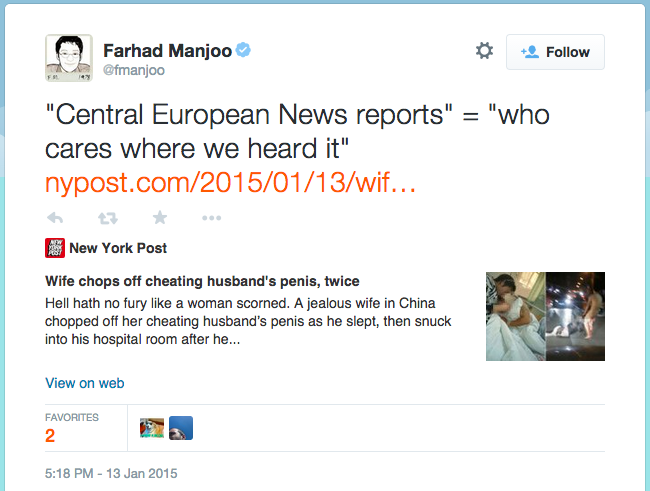
Majoo said in an email that the attribution of such an outrageous story to a small, unknown agency struck him as questionable behavior.
“I see this happen often in tabloids like the Post or Daily Mail or Yahoo or other news sites – references to foreign news services (often in the developing world) whose credibility we have no way of assessing,” he said. “It's just sort of an obvious signifier of the publication thinking that the story is too good to check, that it doesn't really matter if it's true because it's so strange.”
This might be a comforting argument. But the consequence is that real people – an Argentinian teacher, a Russian photo model – are having their lives distorted and paraded before the world. And it also blurs the line between truth and fiction in a way that undermines the integrity of the news media as a whole.
Indeed, the blame for the fact that CEN has been able to circulate such dubious stories does not rest with Michael Leidig alone: He was able to build his business because larger news organisations were so eager to buy what CEN had to sell, knowing that their readers would lap up these lurid tales of faraway people and places.
In that Press Gazette article, Leidig lamented what the internet had done to the economics of newsgathering. “There has never been a better time to be a journalist, if it’s your hobby,” he wrote. “If you hope to make a living out of it, then I can’t remember it being worse.”
He added: “With hundreds of thousands of new items a day, who can tell what is new anymore?”
Or, for that matter, what is real.
Additional reporting by Tanya Chen
---
A few hours prior to the publication of this story, Press Gazette ran a story claiming that BuzzFeed News' investigation into CEN was an attempt to damage a business rival.
In a statement to Press Gazette, Michael Leidig said of the questions we put to CEN: "An internal review here quickly revealed little substance to [BuzzFeed's] claims. When properly analysed, all they had found was that on two occasions we had re-used archive pictures.
“Their repeated assertion that, simply because one of our quotes did not appear in local media, it must have been made up, suggests they don’t have any idea of the real potential to generate good news in the modern landscape. We regard it as an obligation to check where possible local media stories, and we do make calls to police, hospitals, and have alternative sources. We are not paid by our clients just to translate. We are paid to do journalism."
Before publishing this piece, BuzzFeed News approached the sites it believes to be CEN’s biggest customers, the Mirror, the Mail, and Metro, to share its concerns over CEN’s content and to investigate whether the dubious quotes and details had come from the news agency or from their own reporters.
A spokesperson for the Mail, whose parent company also owns Metro, said: “CEN is one of the multiple news agencies that MailOnline and Metro work with to provide stories that we haven’t commissioned ourselves. News organisations around the world all work with numerous reputable news agencies to supply stories that can be taken on trust because the agency has researched, sourced and edited the story.
“Our agreement with each of these agencies requires the stories they provide to be accurate.
“If we independently discover this not to be the case we will adjust the story accordingly and advise the agency who is responsible for the story.
“We have not so far had any complaints about any of the stories provided, however we are reviewing their content with the agency concerned.”
The Mirror said:
“As BuzzFeed itself knows from personal experience, it is hard to verify every fact and detail in stories from other parts of the world, so we do rely on established news agencies, especially for offbeat stories like these. We do basic fact checking, with more detailed examination if the stories contain serious allegations.
“We are proud of being the intelligent tabloid so the last thing we want to do is publish content that is untrue. We take our relationship of trust with our readers extremely seriously and set ourselves high standards of accuracy. If it transpires that any content we have published is significantly accurate or misleading, our policy is to correct or remove it as soon as possible.
“We have asked CEN to investigate BuzzFeed’s allegations and we will be reviewing our processes in light of that information.”
---
BuzzFeed News has, as mentioned in this piece, previously used images from CEN, or followed up reports that originated with the agency. It is now our policy not to do so.
The following is a list of all our pieces that have used CEN/Europics content as far as we are able to determine:
This Is What Happens When You Leave The Hot Tap Running All Winter
A Dog Gave Birth To Green Puppies In Spain
"Black Death" Plague Surfaces In China And Forces Government To Seal Off A Whole City
A Russian Guy Says His Justin Bieber Ringtone Saved Him From A Bear Attack
German Builders Say This Pavement Swastika Was An “Innocent Mistake”
A Man In China Apparently Ended Up Riddled With Tapeworm Parasites After Eating Too Much Sashimi
The Unluckiest Man In The World Set His College On Fire With A Fireworks Marriage Proposal
A University Student Died At A Sperm Bank After Donating For A Fourth Time In 10 Days
Boy Shocked By Electricity Says He Has Superpowers Like Magneto
Russian Footballer Hires Muzzled, Tie-Wearing Bear For Son’s Birthday Party
A list of those stories we have been unable to verify has been added to Emergent and we will update them if fresh information comes in. For more information on BuzzFeed News’ sourcing policy, see our Editorial Standards and Ethics Guide.
The Wikipedia page on Allan Hall created by the user Bylinebandit was a "sandbox" page (an early form of draft page). An earlier version of this article implied that it was a live encyclopaedia entry.
Read our follow up to this article here.


